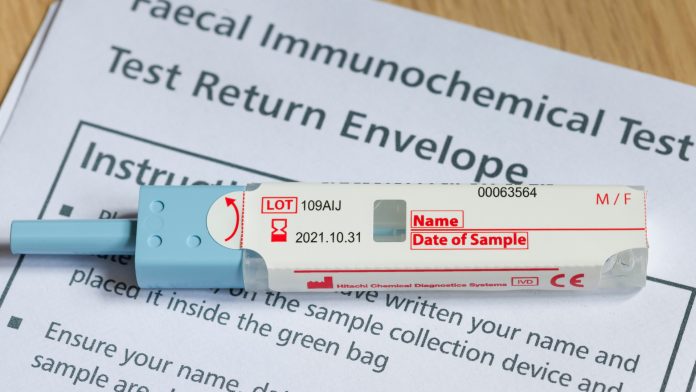
A University of Sheffield study suggests that sending more bowel cancer tests that can be completed at home could save around 11,000 lives in England.
The study, funded by Cancer Research UK, identified that sending more home bowel cancer tests is the most optimal method for reducing cancer care inequalities. The findings highlighted that re-inviting people for bowel cancer screening the following year who did not return their test was the most cost-effective way to increase participation and ultimately reduce mortality from the disease.
The study is published in Preventative Medicine.
Increasing access to bowel cancer tests
Everyone aged between 60 to 74 in England who is registered with a GP is automatically sent a bowel cancer test – known as a faecal immunochemical test (FIT) – every two years. These bowel cancer tests analyse your poo for traces of blood, which can be a common sign of bowel cancer. The tests also look for polyps, which are small growths in the bowel that may become cancerous over time.
The University of Sheffield’s study predicted that sending out more of these bowel cancer tests would result in 13.6% more people returning them in the first year alone. This increase in uptake could prevent 11,000 deaths during the remaining lifetime of people aged 50 to 74 in England – or more than 500 deaths per year.
Additionally, the researchers discovered that annual re-invitation could potentially reduce cancer care inequalities due to people from deprived communities being less likely to complete the tests and reap the benefits of early diagnosis, which contributes to cancer deaths in these areas.
Chloe Thomas, the lead researcher from the University of Sheffield’s School of Health and Related Research (ScHARR), said: “There are many factors that lead to inequalities in bowel cancer mortality, including differences in underlying health conditions and access to treatment. Although screening is just a small part of the picture, it’s vital the programme works for everyone.
“We believe this study identified a cost-effective way to increase screening participation and reduce mortality across all groups while also reducing inequalities. As this was based on modelling, real-world data is needed to confirm our conclusions, so the next step would be to analyse data from a pilot to improve our predictions of long-term mortality benefits.”
Alleviating the UK bowel cancer burden
In the UK, bowel cancer is the fourth most common type of cancer and the second most common cause of cancer death, with mortality rates from the disease being 30% higher for males living in the most deprived areas compared to the least. Furthermore, mortality rates are 15% higher for females, with lower bowel cancer screening uptake in deprived regions potentially causing increased mortality rates.
The recent death of long-time bowel cancer campaigner Dame Deborah James highlighted the urgent need to raise awareness about the disease to save lives. In addition to sending out more bowel cancer tests, the study suggests that advertising campaigns, text message reminders and pre-invite outreach phone calls could increase screening participation. The UK government has pledged to expand bowel cancer screening in England over the next four years to include 50 to 59-year-olds.
However, Cancer Research UK explained that unless measures are taken to enhance participation among people in deprived areas, widening eligibility could worsen cancer care inequalities.
Michelle Mitchell, the chief executive of Cancer Research UK, concluded: “Screening is an effective way of catching cancer early and saving lives, but not everyone engages equally, and this contributes to health inequalities across the UK. This study shows that sending yearly bowel cancer tests to those who don’t complete them could help close this gap and save lives.
“Addressing health disparities is critical to achieving the government’s early diagnosis targets and saving lives. We urge the government to implement a re-invitation pilot as part of its upcoming 10-Year Cancer Plan. We need a cancer plan for all – and bold action, such as this, will benefit future generations.”






















